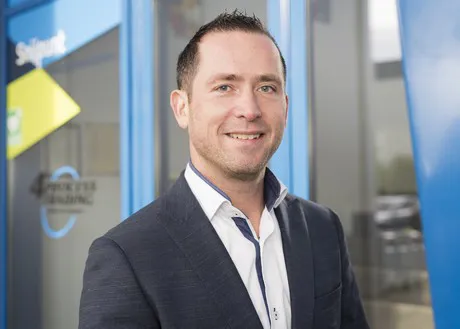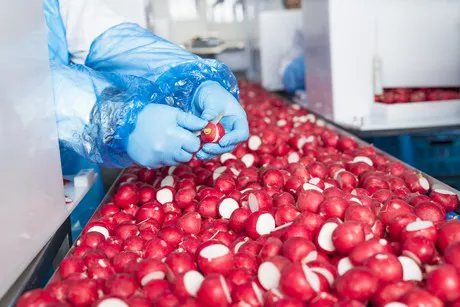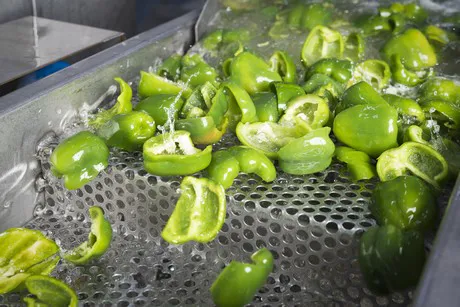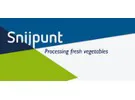Last year Harvest House announced that it would completely take over Snijpunt in order to grow in the market for healthy convenience food products. According to commercial director Marco Romein with Snijpunt, this step offers many opportunities. "This gives our customers more direct access to the source and we are assured year-round of high-quality products, cultivated according to Dutch quality standards."
Snijpunt is a specialist in the processing of vegetables into semi-finished products for vegetable cutting companies, catering companies, food service suppliers and salad or meal producers. “Years of double digit growth, both in semi-finished bell peppers and in our other products, made that a further expansion was necessary. The new construction that is currently being realized shows Harvest House's willingness to invest in the future. This expansion offers opportunities for our joint ambitions," says Marco.
No internal transport in the factory
In January the first pile for the new building was driven. Adjacent to the current location of the vegetable cutting company, 1,900 m2 will be added. With the new construction, the production space is expanded to more than 3,500 m2 and there is room for two extra docks. “But we can use this production space even much more efficiently than before thanks to far-reaching automation. Products and containers are brought in automatically, so that no internal means of transport have to enter the factory anymore and we further optimize the routing of the production. Everything automatically arrives at the destination. In contrast to the past, the products enter the building on one side and exit on the other, so that the cut product is always separated from the raw materials," says the commercial director.
“With the new construction, we have chosen to use the new floor space as a processing area, because through access to the source we can order just-in-time products. For the supply of peppers we already have been working with Harvest House for years. Now that we are part of the group, we can also offer the other greenhouse vegetables to our customers. Peppers have been the main product from Snijpunt from the start. Radishes, cauliflower and broccoli complete the top 4. "The increasing interest in products such as cauliflower and broccoli rice are very interesting for us," says Marco. “We also clean spring onions for our customers and we supply hand-peeled daikon.
Snijpunt focuses entirely on semi-finished products, or pre-cut vegetables that are immediately ready for further processing. "That is a strategic choice. We deliberately do not place ourselves in the position of our customers," says Marco. “We see ourselves as a partner of the vegetable cutting company. Our customers make a well-considered trade-off between cutting in-house or outsourcing to specialized companies. That is why it is up to us to deliver added value by producing efficiently, by being flexible and by having the sourcing organized all year round. The fact that we are now part of the Harvest House cooperative enables us to meet customer-specific certification requirements and the increased demand for chain certification. Our sourcing is structured in such a way that we obtain our product from at least two countries at any time in order to guarantee delivery reliability. As an example, in winter we also purchase products from Spain, Morocco and from one of the Harvest House growers in Tunisia.”
Shashlik
An exception to the semi-finished products are the shashliks, which the company delivers to its customers exactly in the 30/30 cut. “If the weather forecast for tomorrow is 30 degrees, the sale of shashliks is immediately multiplied by 4. The lead times are so short that you cannot work with intermediaries. We supply this market ourselves in the Netherlands, Belgium and Germany. Where the shashliks were previously manually produced by our customers, now robots are often used. Because both bell pepper and onion are round, it is quite a challenge to produce exact blocks of 30x30 mm. The product is cut by machines developed in-house, in such a way that the bulging of the onions and peppers is not reflected in the end product."
The clients of Snijpunt can be found from Sweden to southern Germany and from England to the east of Germany. “In fact all areas that we can reach within a day. We try to deliver to all our customers early in the morning, so that there is no reduction in shelf life," says Marco.
Although the convenience market in German retail is still in its infancy, sales are growing. “Now I don't have many retail customers, our customers are much more in the food service and out-of-home channel. Those sales are not nearly as high as in the Netherlands, but it is showing considerable growth. Our turnover is rising sharply and in the case of broccoli and cauliflower it has even doubled. Despite the fact that the frozen broccoli and cauliflower florets have a good reputation there, the fresh product is gaining increasingly more market share.”
The company sees no future in organic production. “We are SKAL certified, but we are not using that. In addition to the extra costs for the more expensive raw materials, we also have enormous changeover times for organic products because all batches have to be separated on the production line. That is not a profitable operation for us," according to Marco.
“Because of the autonomous growth of our regular customers, we are already making such growth figures that for us there is more focus to keep our existing customers happy than to look for new markets. A challenge is therefore to retain our employees. We have 40 to 50 people working here in the winter and that increases to 90 people in the barbecue season. We have not forgotten that the labor issue is becoming increasingly challenging. The challenge for the coming season is to find and retain sufficiently motivated production employees. Certainly when considering that our customers experience the same problems and we therefore clearly notice that they are increasingly willing to outsource the preliminary work - production of semi-finished products - to us. So it's important for us to have this organized well.”
This article was previously published in edition 3, 33rd volume of trade journal AGF Primeur. Visit www.agfprimeur.nl for more.
For more information:
Snijpunt
www.snijpunt.nl
info@snijpunt.nl
Marco Romein
m.romein@snijpunt.nl
